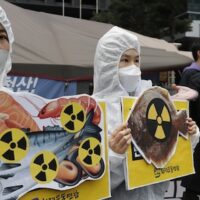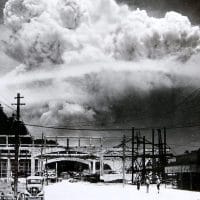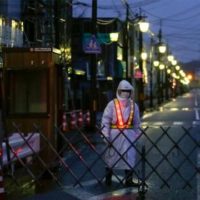-
Grave concerns raised as Japan announces release of radioactive water into the sea
JAPAN has come under fire after its government announced today that it would release more than a million metric tonnes of radioactive water from the destroyed Fukushima nuclear plant into the ocean.
-
U.S. reboots Quad in unseemly hurry
The Japanese news agency Kyodo reported from Washington Sunday quoting “a source” that the Biden Administration had proposed to New Delhi, Tokyo and Canberra the idea of holding an online summit meeting of the leaders of the “Quad”.
-
Why Modi’s government is not up to the task
The Modi regime believes that no matter how impoverished the people are their electoral support can always be won by promoting Hindutva and effecting a communal polarization. It is an utterly cynical view, but then, the present dispensation represents the acme of cynicism.
-
ATOMIC BOMBINGS AT 75: Scholars speak out against ‘unnecessary’ attacks
Japan was ready to surrender, making the atomic bombings of Hiroshima on Aug. 6, 1945, and Nagasaki two days later, totally unnecessary and morally indefensible, say a panel of scholars in two video discussions.
-
Tokyo Olympics and Fukushima “Revival”
At the 1964 Tokyo Olympics a young man born on the day of Hiroshima nuclear bombing was selected to be the last torch bearer on the relay, to signify that Japan had stood up from nuclear ruin. In an attempt to replicate the 1964 Olympic theme, the Abe government has constructed the idea of a Fukushima “revival,” a returned to normal. Exposing this illusion is an important cultural war.
-
Outsourcing exploitation: global labor-value chains
Through their control over supply chains, multinationals based in the global north exploit workers in the global south.
-
Fukushima: an ongoing disaster
n March–on the eighth anniversary of the Fukushima disaster–Time magazine published an article with the headline: “Want to Stop Climate Change? Then It’s Time to Fall Back in Love with Nuclear Energy”.
-
Eight Years After: No End in Sight for Clearing the Fukushima Nuclear Disaster
The most critical problem is that three reactors in the Fukushima Daiichi nuclear power plant had been damaged and the 250 tons of more than 1600 spent fuel rods were “reckoned” to have fallen to the bottom of the reactor vessel after having melted at high temperatures. The radiation level there was too high for humans to possibly come close, let alone remove the molten nuclear residue.
-
A lifetime opposing the U.S. military on Okinawa
There are eighty of us sitting down, linking arms, blocking the gates of a US military base. Private security guards are lined up behind us, while men in uniform film us from behind barbed-wire fences. Suddenly, Japanese police officers pile out of their vans in their dozens. They grab a protester, a woman in her seventies. She goes limp and screams “US bases out of Okinawa!” as they carry her away.
-
Why the United States did not demonstrate the bomb’s power, ahead of Hiroshima
Would non-use at the end of a brutal total war have created a taboo against the use of nuclear weapons as strong as resulted from the demonstrated horror of their effects against the two Japanese cities? Perhaps not.
-
Fighting for Okinawa
Our story though, is much more than three short paragraphs in a textbook. It is a story about a people’s determination for sovereignty in the face of imperialism, resilience in midst of colonization, and perseverance for peace as survivors of war. Our story is urgent and it is a call for global action in the name of peace and justice. The history of Okinawa is a story of resistance but also a call to the world.
-
The Election of Donald Trump
1. The recent election of Donald Trump after Brexit, the rise of fascist votes in Europe, but also and much better, the electoral victory of SYRIZA and the rise of Podemos are all manifestations of the depth of the crisis of the system of globalized neoliberalism. This system, which I have always considered unsustainable, is imploding before our eyes at its very heart. All attempts to save the system — to avoid the worst — by minor adjustments are doomed to failure.
-
Spanish Recollections: the 80th Anniversary of the International Brigades
In one hurrying day, eighty years ago, in Albacete, a center of Spain’s La Mancha region, a few officers somehow created quarters for five hundred men arriving the following day, then five hundred more, and more. Soon three or four thousand, somehow organized in units despite a mad variety of languages, were issued a motley […]
-
The Imperial War Museum in London: A Lesson in State Propaganda?
In January 2016, I attended Tate Britain’s Artist and Empire: Facing Britain’s Imperial Past, a disappointing exhibition that in spite of its title did not face Britain’s past in any meaningful way. On the contrary, as I argued in my review, it shied away from this bloody history in favour of quasi-glorification, non-committal wording and […]
-
Brexit and the EU Implosion: National Sovereignty — For What Purpose?
The defense of national sovereignty, like its critique, leads to serious misunderstandings once one detaches it from the social class content of the strategy in which it is embedded. The leading social bloc in capitalist societies always conceives sovereignty as a necessary instrument for the promotion of its own interests based on both capitalist exploitation […]
-
Three Songs of the Crème de la Crème
Plutocracy the Wonderful O beautiful, our properties Our lands and woods and grains Our fields and mines and factories Our ships and trains and planes! Accumulate, accumulate! We never get enough Of profits, income, capital, and other lovely stuff. O beautiful, our trophy wives Their diamonds, furs, and shoes Our speedboats, cars, jets, limousines Our […]
-
We Stand with Palestine in the Spirit of “Sumud”
At a moment of growing resistance to state violence and injustice the world over, a delegation of nineteen anti-prison, labor and scholar-activists from the United States traveled to Palestine in March 2016. Our delegation included former U.S.-held political prisoners and social prisoners, former Black Panther Party members, prison abolitionists, trade unionists and university professors. We […]
-
Watch Out for Judicial Coup in Brazil
The judicial coup against President Dilma Rousseff is the culmination of the deepest political crisis in Brazil for 50 years. Every so often, the bourgeois political system runs into crisis. The machinery of the state jams; the veils of consent are torn asunder and the tools of power appear disturbingly naked. Brazil is living through […]
-
A Doctor’s Degree at 102
102-year-old Ingeborg Syllm-Rapoport receives diploma 77-years after Nazis denied it http://t.co/KBB4iyTPfo — Ruptly (@Ruptly) June 9, 2015 The frail, white-haired little lady stepping slowly up onto the stage of the Babylon cinema theater in Berlin — to giant applause — was not wearing a collegiate cap and gown. But she had undoubtedly made academic history. […]
-
Unending Hard Times: Whose Is the Toil and Whose Is the Wealth?
John Bellamy Foster and Robert W McChesney. The Endless Crisis: How Monopoly-Finance Capital Produces Stagnation and Upheaval from the USA to China. New York: Monthly Review Press, 2012; Kharagpur, India: Cornerstone Publications, 2013. pp x + 227. Rs 150. The secular decline of decadal average annual real gross domestic product (GDP) growth rates of the […]












